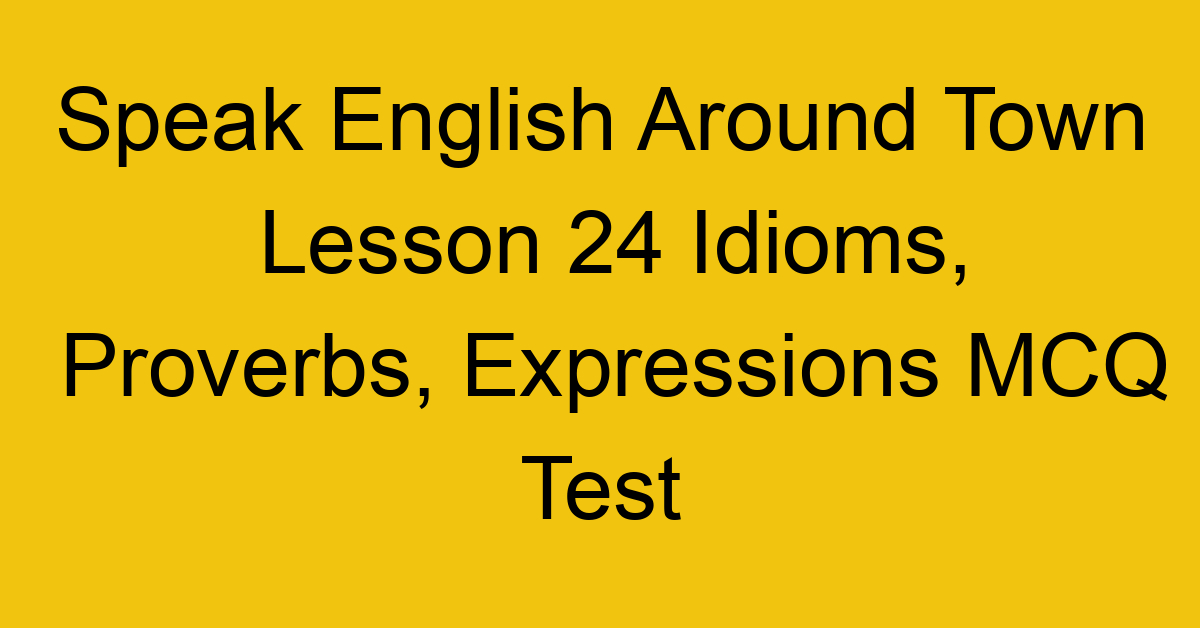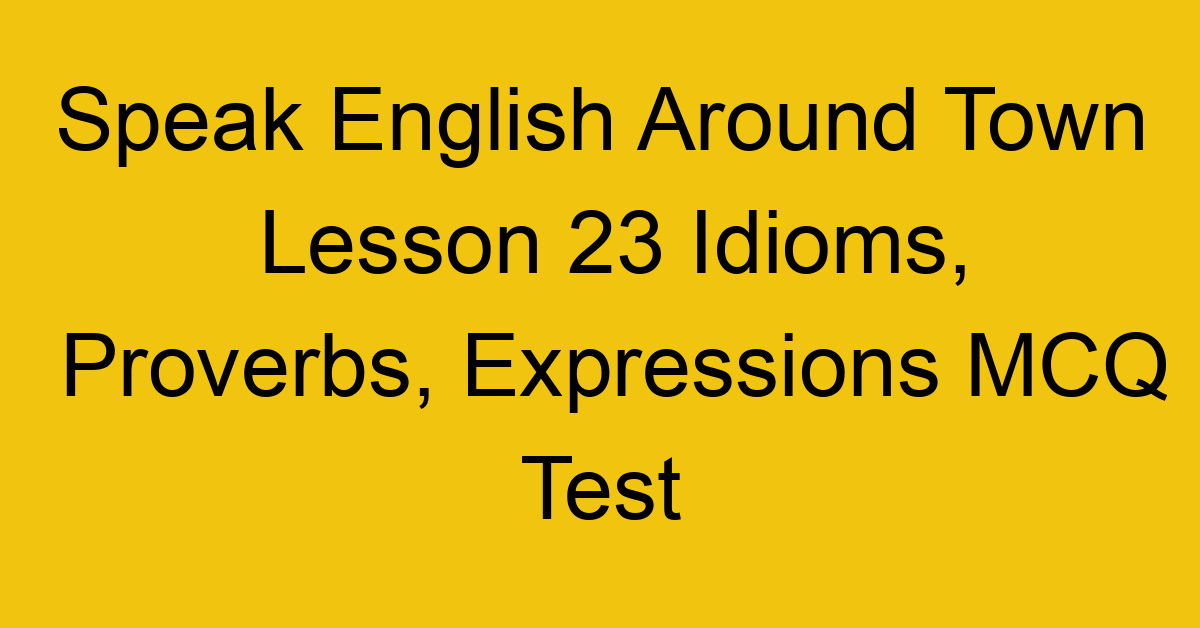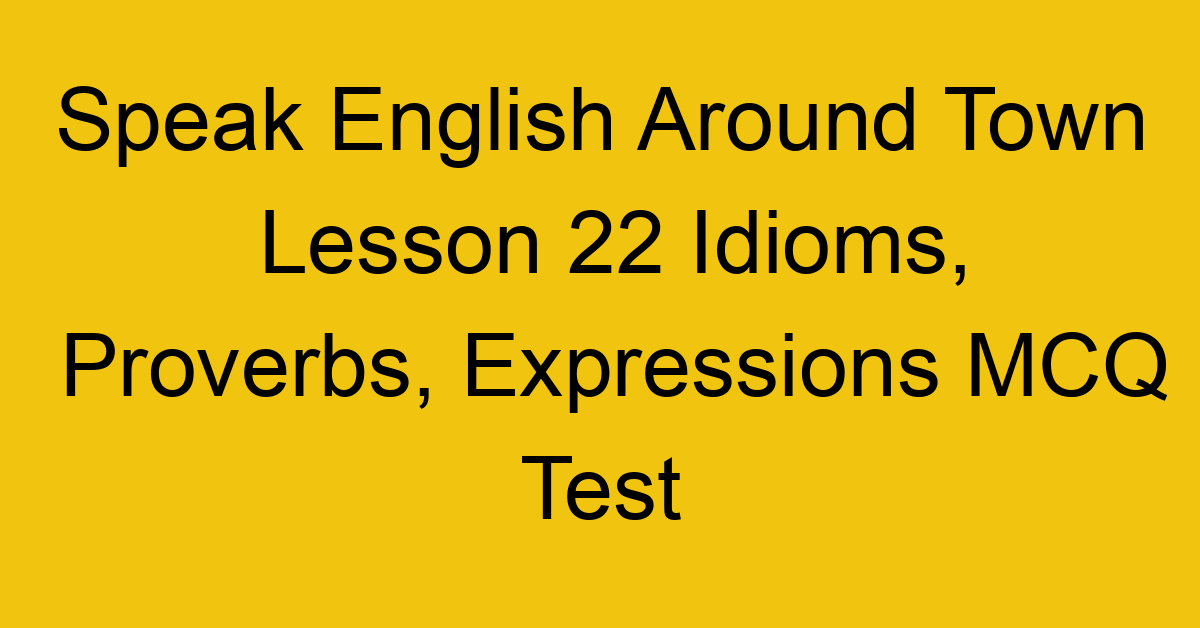Speak English Around Town Lesson 25 Idioms, Proverbs, Expressions MCQ Test
LESSON 25 – Reacting to Bad News
REACTING TO BAD NEWS
Jenny runs into her friend Carol in the supermarket. Jenny asks. Carol how she’s been and Carol tells her all her bad news. Jenny responds with sympathy and offers her support.
Jenny: Hi, Carol. How’s life been treating you?
Carol: I’ve been better. I’m going through a rough patch.
Jenny: Sorry to hear that. What’s going on?
Carol: My husband and I are splitting up. I found out he’s been cheating on me for years with his receptionist.
Jenny: I’m speechless!
Carol: Fortunately, I wasn’t speechless when I found out. I gave him a piece of my mind!
Jenny: Good! And how’s your son John doing? Did he manage to find a job since we last spoke?
Carol: No such luck. Poor John fell off the roof a couple weeks ago while doing some repairs and broke both his legs!
Jenny: You must’ve been beside yourself!
Carol: I was a basket case for several days. Now he’s on the road to recovery, but it’s going to take a while.
Jenny: If you ever want to talk, just give me a call.
Carol: I would enjoy getting together.
Jenny: Okay. I’ll stop by later this week.
Language Lens: When Two Verbs Are Together
When there are two verbs in a row (one after the other), the second verb is sometimes in the infinitive form (“to” form) and sometimes in the gerund form ( ending in -ing). The first verb determines (Verb 1) the form of the second verb (Verb 2). Study these two tables with common verbs.
|
Verb 1 + Verb 2 in the Infinitive (“to” form) |
|
|
Verb 1 |
Verb 2 is in the infinitive |
|
agree |
I agreed to pick Sue up from the airport. |
|
cause |
What caused Nick to break out in a rash? |
|
deserve |
We deserve to know why the company is closing. |
|
expect |
When does your son expect to graduate? |
|
hope |
We hope to visit some castles on our trip to Ireland. |
|
learn |
Lisa learned to ski on her vacation. |
|
offer |
Please offer to help bake cookies for the bake sale. |
|
manage |
Did you manage to get to the airport on time? |
|
promise |
I promise to call you as soon as we arrive in Paris. |
|
want |
What do you want to do this weekend? |
|
Verb 1 + Verb 2 in the Gerund (-ing form) |
|
|
Verb 1 |
Verb 2 is a gerund |
|
appreciate |
We appreciated having a great tour guide in China. |
|
avoid |
Let’s avoid getting food poisoning on our trip. |
|
consider |
We considered renting instead of buying a house. |
|
enjoy |
John enjoys surfing in Big Sur . |
|
feel like |
What do you feel like doing today? |
|
finish |
When you finish watching the movie, let me know. |
|
mind |
Do you mind going to the store? |
|
recommend |
I recommend exploring Chicago by foot. |
|
suggest |
I suggest building a new website. |
|
think |
You think getting a medical degree is easy? |
IDIOMS
- basket case
→ an emotional and/or physical mess
Example: After her house burned down, Donna was a basket case.
- beside oneself
→ very upset
Example: When Tracy’s boss told her she wasn’t doing a good job, she was beside herself.
- (to) cheat on someone
→ to have romantic relations on the side, with somebody other than one’s partner
Example: After Nancy read the text messages on her husband’s cell phone, she realized he was cheating on her.
- (to) find out
→ to discover facts about someone or something
Example: I just found out that Tanya is pregnant.
- (to) get together
→ to meet with someone (usually socially)
Example: I’d love to get together on Saturday if you have time.
- (to) give someone a piece of one’s mind
→ to tell someone what one really thinks
Example: Our waiter has been really slow all evening. I’m going to give him a piece of my mind!
- (to) go through a rough patch
→ to have a lot of problems during a time period; to experience a period of bad luck
Example: Joe lost his job last week and this week his girlfriend broke up with him. He’s going through a rough patch.
- How’s life been treating you?
→ How are you?; How’ve you been?
Example: “How’s life been treating you?” – “Can’t complain.”
- I’ve been better
→ things are not going well for me
Example: “How are you doing?” – “I’ve been better.“
- no such luck
→ we haven’t had good fortune in that area; we haven’t been so lucky
Example: “Did your boss let you out early for the holiday weekend?” – “No such luck.“
- (I’m) sorry to hear that
→ that’s too bad; I feel bad for you
Example: “I got fired yesterday.” – “Sorry to hear that.“
- speechless
→ unable to speak due to surprise; shocked
Example: After being fined $300 for a speeding ticket, Wendy was speechless.
- (to) split up
→ to break up; to end a marriage or other intimate relationship
Example: After years of fighting, Irene and her husband finally split up.
- (to) stop by
→ come over (often for a short visit)
Example: If you’re in my neighborhood on Saturday, please stop by.
- on the road to recovery
→ starting to get better
Example: Stephanie was sick with the flu for a week, but now she’s on the road to recovery.



